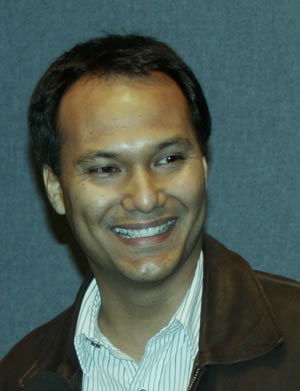Olin Lagon
“He is already an effective leader in the Native Hawaiian community and he clearly has tremendous promise to do great things in the future.” That’s how Olin Kealoha Lagon was first introduced to the Petra Foundation. It was an understatement.
A high-school dropout who remembers not doing a single piece of homework, Olin Lagon grew up poor in communities plagued by gang violence, domestic abuse and drugs. Now in his early thirties, Lagon is CEO of a community-owned high-tech start-up, Hawaiian Homestead Technologies (HHT), whose mission is to create jobs in those same communities. As one recent hire put it, “A lot of people don’t think that Hawaiians can work with computers. I guess we’re proving them wrong.”
Lagon was born in Hawaii, to a Hawaiian mother, Evelyn Kamakau and an immigrant father, Maximo Lagon, who hailed from Ilocos Norte province in the Philippines. After his father died when he was six, he and his three sisters were raised by his mother in public housing projects. Neither of his parents was educated beyond the sixth grade and only one of his sisters earned a high school diploma.
After dropping out of high school, Lagon was sent to an aunt who lived in Mississippi and studied diesel mechanics at a military school there. Away from destructive influences, he found his footing. He returned to Hawaii and enrolled at a community college. He moved on to the University of Hawaii, where he graduated with a perfect 4.0 in a double major in international entrepreneurship and accounting. He completed the International Management program at the Pacific Asian Management Institute, won a Fellowship at the internationally acclaimed East-West Center and studied abroad in five countries.
In his early twenties, as chief architect, Lagon helped to start and head a new Hawaiian information management company. In short order, WorldPoint’s award-winning software was adopted by Nike, Kodak, FedEx, Disney and MIT and, within six years, the firm had opened offices in five countries with over a hundred employees. Intrigued by his travels and eager to learn more about other cultures, Lagon left his business career in 2000 and, with his wife, Alison Awa, joined the Peace Corps and taught at a college in rural Russia. Challenged by the need to master a difficult language and to nurture entrepreneurship in an inhospitable climate, he worked with his most motivated students to found Verbioso.com, which now sells online Russian language tools to satisfied customers in dozens of countries.
Lagon came home to Hawaii to launch Hawaiian Homestead Technologies (HHT). Wholly owned by the Council for Native Hawaiian Advancement, HHT provides computer training and jobs for Native Hawaiians living on or near Hawaiian Homesteads. One of his colleagues at HHT asks, “What could be more important than creating good-paying jobs, training Native Hawaiian people to get and keep these jobs and all that flows from this kind of empowerment to people who otherwise probably would not have had the opportunity?”
The almost instant success of HHT led Lagon to another start-up: the Intertribal Information Technology Company. A strategic alliance among Native Hawaiian, Alaskan Native and American Indian IT companies, IITC has already won over $65 million in contract work, which translates to nearly 300 new technology jobs in some of the most economically challenged communities in the United States. Alison and Olin’s newest and most important start-up is Noah, their infant son.
 Photo by Sarah Robbins
Photo by Sarah Robbins